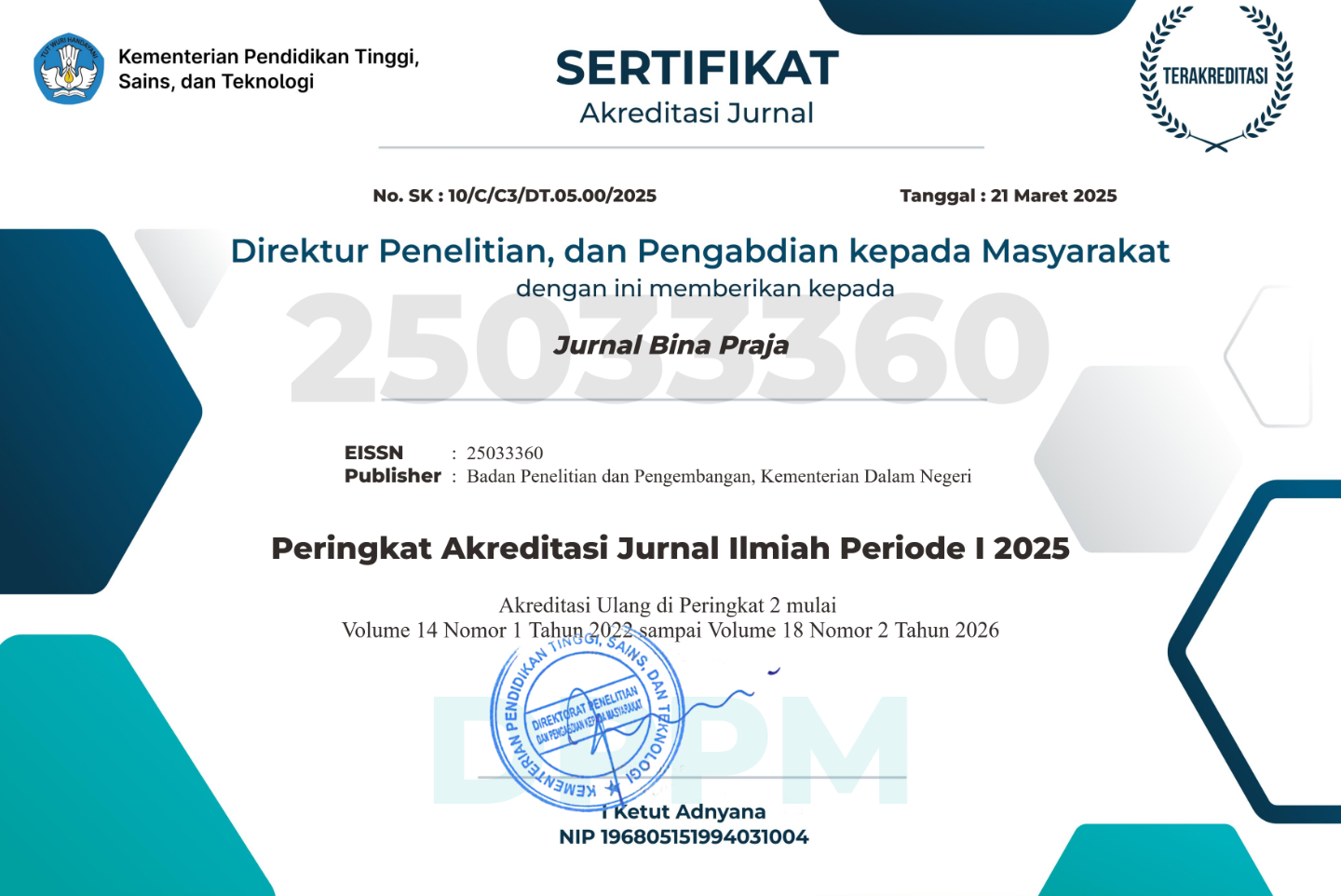Development of Innovation Project as the Result of Leadership Training Through the Innovation Actor Collaboration Model in the Region
DOI:
https://doi.org/10.21787/jbp.09.2017.335-343Keywords:
Project of Change, Innovation, Training, CollaborationAbstract
This study is motivated by the change project’s sustainability problem based on the study of PKP2A II LAN (2016) study team, identified after Level IV and Level III Leadership Training (Diklatpim). After the training, there are still some milestones or goals of the projects that have not been achieved. Medium-term and long-term goals have not been assessed because the new Diklatpim only review the general implementation of change projects during the training session. The change projects produced in the process of Diklatpim to achieve short-term goals may have a prospect to be expanded, enabling it to maintain its sustainability and to provide benefits for the region especially in the provision of public services. The current conditions rely solely on the alumni of Diklatpim and their mentors, which makes it somewhat difficult to maintain the sustainability of the change projects effectively. This study aims to provide an alternative policy solution for regional governments to improve the sustainability and increase the scale of the Diklatpim’s change projects. Using literature study methods and qualitative approach, a collaborative model of innovation actors in the regional government for the development of innovation projects is developed. The collaborative model resulting from this study is called the WPPPA Model. This model is a collaboration model between Widyaiswara, Researcher, Planner and Diklatpim Alumni. The successful collaboration process undertaken by key innovation actors will be useful to maintain the sustainability of change projects on a broader scale and increasing the outcome of regional innovation sourced from the change projects.
Downloads
References
Budiati, L. (2016). Diklat Kepemimpinan Pola Baru dalam Perspektif Inovasi dan Pembelajaran Konstruktivistik. Jurnal Pembangunan Wilayah & Kota, 11(2), 211. http://doi.org/10.14710/pwk.v11i2.10849
Government Regulation Number 38 of 2017 on Regional Innovation, Pub. L. No. 38 (2017). Indonesia.
Hargadon, A., & Sutton, R. I. (2000). Building an innovation factory. Harvard Business Review, 78(3), 157–66, 217. Retrieved from http://www.ncbi.nlm.nih.gov/pubmed/11183977
Hartiningsih, Hermawati, W., Maulana, I., & Rosaira, I. (2014). Peran Jejaring dan Aktor dalam Mempertahankan Kesinambungan Energi di Perdesaan. Seri Laporan Teknis Penelitian. PAPPIPTEK-LIPI.
Haryono, N. (2012). Jejaring untuk membangun kolaborasi sektor publik. Jurnal Jejaring Administrasi Publik, 4(1), 47–53. Retrieved from http://journal.unair.ac.id/ADMP@jejaring-untuk-membangun-kolaborasi-sektor-publik-article-9496-media-81-category-8.html
Kardoyo, H., & Dolant, S. (2009). Intensitas Jejaring Litbang dalam Sistem Inovasi Sektor Kesehatan dan Obat-obatan: Studi Kasus 12 Pelaku Industri Kesehatan dan Obat-obatan. Kebijakan Iptek & Manajemen Litbang, 1(2), 141–156. Retrieved from http://www.jurnal.lipi.go.id/publikasi.cgi?tampilpublikasi2&1095014210&Indonesia&vol=1&1327363751
Kartika, R. S. (2017). Local Government Readiness in Developing SIDa Roadmap in Banten, West Sumatera, and Bali. Jurnal Bina Praja, 9(1), 127–136. http://doi.org/10.21787/jbp.09.2017.127-136
Law of the Republic of Indonesia Number 23 of 2014 on Regional Government, Pub. L. No. 23 (2014). Indonesia.
Law of the Republic of Indonesia Number 5 of 2014 on State Civil Apparatus, Pub. L. No. 5 (2014). Indonesia.
Minister of Research and Technology, & Minister of Home Affairs. Joint Regulation of the Minister of Research and Technology with the Minister of Home Affairs No 3 of 2012 and No 36 of 2012 on the Strengthening of the Regional Innovation System (SIDa), Pub. L. No. 3 & 36 (2012).
Mukhlis, M. (2016). Menakar Peluang Munculnya Inovasi Daerah Pasca Undang-undang 23 Tahun 2014 (Studi pada Hasil Diklatpim IV Kabupaten Pringsewu Provinsi Lampung). CosmoGov, 2(1), 1–22. http://doi.org/10.24198/cosmogov.v2i1.11848
Mulyana, & Sutapa. (2014). Peningkatan Kapabilitas Inovasi, Keunggulan Bersaing dan Kinerja melalui Pendekatan Quadruple Helix: Studi pada Industri Kreatif Sektor Fashion. Jurnal Manajemen Teknologi, 13(3), 304–321. http://doi.org/10.12695/jmt.2014.13.3.5
Mulyono, F. (2008). Inovasi di Sektor Publik. Jurnal Administrasi Publik, 5(2), 130–144. Retrieved from http://journal.unpar.ac.id/index.php/JAP/article/view/1564
PKP2A II LAN. (2016). Laporan Kajian Sustainibilitas Inovasi Alumni Diklatpim III dan IV. Makassar: PKP2A II LAN.
Priyatma, J. E. (2013). Potensi Teori Jejaring Aktor untuk Memahami Inovasi Teknologi. In Seminar Nasional RITEKTRA 2013 (Riset dan Teknologi Terapan). Retrieved from https://repository.usd.ac.id/4456/
Putera, P. B. (2012). Perspektif Sistem Inovasi dalam Konten Kebijakan Daerah Jawa Timur Bidang Iptek dan Inovasi Periode 2000-2011. Warta KIML, 10(2), 83–98. Retrieved from http://situs.jurnal.lipi.go.id/wartakiml/
Regulation of the Head of National Institute of Public Administration Number 19 of 2015 on Guidelines for Implementing Leadership Education and Training Level III, Pub. L. No. 19 (2015). Indonesia.
Regulation of the Head of National Institute of Public Administration Number 20 of 2015 on Guidelines for Implementing Leadership Education and Training Level IV, Pub. L. No. 20 (2015). Indonesia.
Rokhyadi, A. (2013). Dampak Strategi Inovasi Non Teknis dan Kolaborasi Aktivitas Inovasi pada Kinerja Perusahaan. EFEKTIF: Jurnal Bisnis Dan Ekonomi, 4(1), 15–25. Retrieved from http://jurnalefektif.janabadra.ac.id/wp-content/uploads/2015/11/Efektif-Juni-2013_2.pdf
Rusmulyani. (2015). Efektifitas Penyelenggaraan Diklat Kepemimpinan Pola Baru terhadap Kinerja Aparatur (Studi Kasus Diklatpim IV pada Badan Diklat Provinsi Bali). Jurnal Lingkar Widyaiswara, 24–51. Retrieved from http://juliwi.com/edisipitiwi3.html
Schilling, M. A. (2015). Manajemen Strategis Inovasi Teknologi. Yogyakarta: Pustaka Pelajar.
Soesanto, H. (2016). Dukungan Regulasi terhadap Inovasi Penyelenggaraan Pemerintahan Daerah. Jurnal Litbangda, 1.
Suhendra, A. (2017). Kesiapan Pemerintah Daerah dalam Mewujudkan Kota Cerdas di Bandung dan Surabaya. Matra Pembaruan, 1(1), 1–9. http://doi.org/10.21787/mp.1.1.2017.1-9
Taufik, T. A. (2005). Pengembangan Sistem Inovasi Daerah: Perspektif Kebijakan. Jakarta: Badan Pengkajian dan Penerapan Teknologi.
Utomo, T. W. W. (2016, June 1). Leadership Training as Shared-Value Creation Process in Indonesia’s Public Service System. Revolusi Mental: Creating Shared Value in Public Sector for Sustainable Innovation and Development. Jakarta, Indonesia.
Wahyudianto, H. (2015). Pengukuran Tingkat Kepuasan Masyarakat terhadap Pelaksanaan Kebijakan Pelayanan Pemerintah. Jurnal Bina Praja, 7(4), 331–345. http://doi.org/10.21787/JBP.07.2015.331-345
















